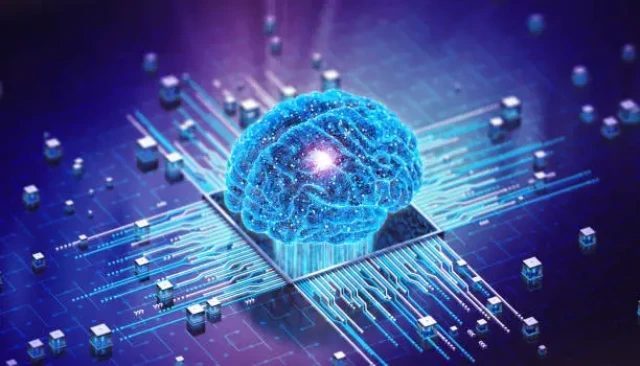"How Artificial Intelligence Is Transforming Creativity, Work, And Our Future"
- Posted on 11-10-2024
- Technology
- By Saumy Verma
- 434 Views
In a world that feels increasingly dominated by technology, Artificial Intelligence (AI) stands at the frontier of a new era. Whether we recognize it or not, AI is already embedded in our daily lives, influencing everything from our social media feeds to the cars we drive and the recommendations we get on streaming platforms. But beyond its practical applications, AI is poised to do something even more profound: redefine what it means to be human.

In this blog, we will delve into the multifaceted world of Artificial Intelligence, not just from the standpoint of technology, but from a more philosophical, ethical, and future-focused lens. What does AI mean for the future of creativity, work, ethics, and even our understanding of consciousness?
1. AI and the New Renaissance: A Leap for Creativity
AI is not just about crunching numbers or automating routine tasks. One of its most profound impacts is on the realm of creativity. Tools like DALL·E, ChatGPT, and MuseNet show that AI is capable of generating images, writing stories, composing music, and even painting. While some argue that AI is merely a tool—lacking the intuition and emotional depth that a human artist brings to the table—there is growing evidence that AI can inspire and collaborate with human creativity in unprecedented ways.
AI-generated art challenges our preconceptions of creativity. Can a machine truly understand beauty, or is it simply replicating patterns based on data? The debate continues, but one thing is certain: AI can help humans discover new perspectives, break creative blocks, and produce art that would have been unimaginable without it.
2. Work, Automation, and the Human-AI Synergy
One of the most discussed topics around AI is its potential impact on jobs. From self-driving cars to AI-powered customer service bots, automation is already reshaping industries. The fear of job loss due to AI is real—many low-skilled roles are being replaced by machines that can operate more efficiently. However, this dystopian view overlooks a deeper truth: AI is not here to replace humans but to augment them.
AI can take over repetitive, menial tasks, freeing up human workers to focus on creative problem-solving, emotional intelligence, and complex decision-making. For example, doctors are using AI to analyze medical data, but they still play the critical role of interpreting results and interacting with patients. In the future, AI might not just be a tool, but a collaborator—a "cognitive partner" that helps us achieve greater efficiency and creativity than ever before.
3. Ethics: The Consciousness Conundrum
One of the most exciting—and terrifying—questions surrounding AI is whether machines can ever truly be conscious or self-aware. Right now, AI operates based on algorithms and data processing. It doesn’t "feel" in the way humans do, nor does it have subjective experiences. But as AI becomes more sophisticated, how close might we come to creating something that resembles consciousness? Will AI ever experience emotions, or is it simply an extremely advanced mimicry of human behavior?
This raises important ethical questions. If AI were to develop a form of self-awareness, would it have rights? Could it experience suffering, or would it only simulate these emotions for the sake of interaction? The answer is still elusive, but it is one that we must grapple with as we move further down the AI rabbit hole.
4. AI and the Future of Learning: Personalization at Scale
Imagine a classroom where every lesson is tailored to each student's learning pace, strengths, and weaknesses. AI is revolutionizing education by making this a reality. Adaptive learning technologies powered by AI can analyze a student's performance in real-time and adjust the content accordingly, ensuring no one is left behind and every student reaches their full potential.
AI can democratize education, offering personalized tutoring and mentorship on a scale never seen before. But it also raises the question: how much should we rely on algorithms to teach our children? Will human educators become obsolete in this new age of personalized learning?
5. AI's Role in Solving Global Challenges
Beyond individual sectors, AI has the potential to tackle some of the world's most pressing problems. From climate change to healthcare, AI can analyze massive datasets to identify trends and solutions that would otherwise be impossible for humans to discern. Researchers are using AI to predict climate patterns, track deforestation, and even develop new medicines.
However, these advancements come with their own challenges. For instance, who owns the data that AI uses to solve these problems? How do we ensure that AI is applied in ways that benefit all of humanity, and not just the wealthy or powerful?
6. The AI Paradox: Progress Through Uncertainty
AI is a double-edged sword. While it offers incredible potential to enhance our lives, it also raises profound questions about control, security, and bias. AI systems are only as good as the data they are trained on, and if that data is biased—whether intentionally or unintentionally—the results can be discriminatory and harmful. The infamous example of AI algorithms showing racial or gender biases in hiring or law enforcement practices is a stark reminder that these tools need rigorous ethical oversight.
As AI technology continues to evolve at an exponential rate, it is easy to feel both awe and fear. The paradox is that, while we may be advancing toward a world of limitless possibilities, we are also stepping into an unknown landscape filled with ethical dilemmas and unforeseen consequences. The future of AI is not just about the technology itself, but about how we choose to use it.
7. A Vision for the Future: Humanity and AI in Harmony
So, where does this all leave us? As AI continues to evolve, we must remember that it is not a monolithic force. It is a tool—a reflection of human ambition, creativity, and, perhaps, our own imperfections. Rather than fearing AI’s rise, we should embrace it, but with careful consideration of its ethical implications, its role in our society, and the values we hold dear.
The future is not one where machines rule over humans, but one where AI and humanity co-exist, complementing one another to create a better world. A world where AI enhances human creativity, makes our lives more efficient, helps us solve problems, and challenges our understanding of what it means to be human. In this world, we become not just users of AI, but co-creators of a new age—a Renaissance powered by intelligence, both artificial and human.



